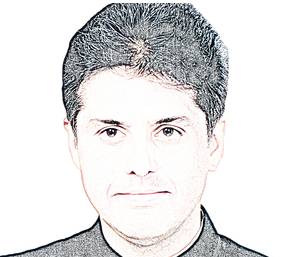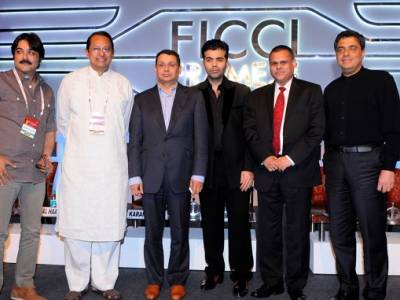MIB is licensor, stakeholder, regulator: Manish Tewari
Manish Tewari, Union Minister for Information & Broadcasting was there to attend FICCI FRAMES 2013. This is the full video speech that Tewari gave while addressing the audience at media & entertainment's mega event.
Good morning ladies and gentlemen, please accept my apologies. As a result of the parliament being in session, I have not been able to make it in Mumbai amongst you all for this very important conference which the Federation of Indian Chamber of Commerce and Industry has organised. I have had the privilege of being briefed extensively about the discussions that have taken place and I am sure that this conference will come out with an appropriate take away which both the industries and government would be in a position to implement in order to ensure that we are able to make the sector far more robust and vibrant than it already is.
As it happens in governments, the information and broadcasting ministry has its various limits, we are licensors, we are also stakeholders in the media industry, and we are also regulators of some sort. Therefore it is a mixed bag which you have to really banister as the person who is in charge of the information and broadcast limit of the government. However I would not like to focus upon the initiatives the government has taken over all these years specifically with regard to making the entire broadcasting sector far more transparent and far more attractive in terms of an economic proposition. But I will try to choose and address the four or five issues which my friend who is the chairperson of the FICCI entertainment committee Uday Shankar has apparently raised in the inaugural speech, a copy of which he was kind enough to send to me.
I cannot agree with the sentiment that media and entertainment industry is not only a huge economic multiplayer but it also has the potential of absorbing the creative intellect of our younger people as India goes into its next two decades of its economic trajectory. It is therefore incumbent upon the government that we put in place the appropriate mechanism which try and play the role of a facilitator and an enabler that in order for this sector is even at a far more rapid pace than what it has witnessed in the last couple of years.
Uday in his speech has specifically referred to two issues, one was with regard to increased customs duty on set top boxes and I believe the other issue was withholding of content rights and taxation bought on it, If I got it correct. So as far as the first part is concerned, digitization has been a unique experiment which my honourable predecessor took upon as a legal remit in order to see that cable and television which is analogy across 51 present of television homes in this country is digitised. In the first phase we went through a digitisation process in Mumbai, Delhi, Kolkata and in Chennai. By and large this digitisation process has been successful but what is also come out as a result of this is that most of the set top boxes are imported from our neighbouring countries especially South East Asia. So it is important that when such a huge exercise is undertaken which involves a revenue of about four to five billion dollars essentially paid by the Indian and multi system operators there must be some tangible benefits which must accrue to the Indian manufacturer so therefore to give the Indian manufacturer and to see that a part of this huge economic cake in the broadcasting sector does translate into tangibles in terms of providing appropriate incentives to the Indian manufacturing sector. The finance minister in his wisdom decided that the duty on set top boxes needs to be increased slightly, so therefore I don’t think it has to be seen as an attempt to stall digitisation or set the process of digitisation backwards. It needs to be seen in its proper prospective that we as a country also do have a responsibility and a certain amount of vibrancy in our manufacturing sector as we implement this. Some of the sectors are made far more transparent and robust as we go into the second phase of our digitisation across 38 cities. I think it is very important for the industry also to realise that there may be a legal contract which backs this entire process and also a social context which calls upon all stake holders to this process whether they are broadcasters or multisystem operators or the local cable operators to internally sort out the issues they have because eventually this process needs to be a win-win situation from everyone, broadcaster to the consumer and if any section within this larger family feels short changed then obviously there is a cause of concern and that is where the industry needs to walk the extra mile in order to ensure as we unfold the process. In the third and fourth phase this is a process which enjoys the backing of all the stake holders irrespective of wherever in the value chain they fit in. Similarly, the film industry has been one of India’s greater strengths be it Bollywood or regional films like Tamil, Telugu, Bengali … for the lack of time I wouldn’t go into all the languages which have added to the diversity of India’s soft power initiative as it has unfolded over the last 100 years and the beauty is that the Indian film industry has grown not because of the government, it has grown despite of the government, that is why we have been working to ensure that there is a single window clearance especially for people who want to come in from abroad and use Indian locales for shooting that clearance time between state and central government can be cut down and also issues which have come up regarding the certification process, though the entry of section 60 gives this power entirely to the union government to certify films fit or unfit for public viewing. The state governments have been organising a certain law and order remit for all powers which flow out of entry of section 33 of the state list. Therefore to reconcile and harmonise this, we have set a committee with former Chief Justice Mukul Mudgul to see that the integrity and robustness of the central board of film certification process is protected and film producers don’t have to go hand in hand from secretariat to secretariat even after they have been certified by the central film certification. I do hope this committee would be able to send its report as early as possible so that we can translate it into appropriate legal frame work and if it needs to be taken to the parliament, we shall take it in the next session.
Another issue which Shankar had flagged off in his speech was the crisis of talent, within the industry, and I think that is something that needs to be looked after in terms of public- private partnership. Off course the government has its film institutes, institutes in the information sector and also in the training and certification of journalists. But a far greater initiative in this regard will be especially when we go into technical prospects of broadcasting and film making. We really need to come out of the private sector and if there are any suggestions on how this could be a viable economical model we are prepared as a government to look at it.
Since this is a recorded speech and not the same how you talk to a live audience, so you are constricted by looking into a camera constantly. Therefore I would like to round it off by saying that the last issue that Uday Shankar addressed during his speech is that of freedom of speech and expression and he had some strong words to say about it. I would just like to say that freedom of speech and expression is something that is guaranteed by the constitution, guaranteed by article 19 of the constitution, but the same constitution which guarantees the freedom of expression and speech also imposes certain reasonable restrictions on it and I think the challenge here is to see as to how we can find the golden weave between this liberty and the reasonable restrictions imposed on it by the constitution makers. But if you personally ask me the freedom of speech and expression does include the right to offend but then as someone is a practising lawyer, I ask myself this question what about my remedy if I have a legitimate grievance with the offence which has been caused to me as a result of certain amount of irresponsible attitude being interpreted as the freedom of speech then do I have appropriate remedy which can restore to me my dignity which are equally guaranteed by the constitution of India. Therefore the more we unfold this debate further, I think it is worth the while for the industry to introspect that there is a distinction between a debate which is honest and something which can be frozen to the national spirit. As India goes into the next two decades of its economic trajectory, this is the space for consolidation and in this space while we require robust oversight we need to safeguard at least the corrosive nature of discourse which also has the ability to derail India’s quest to be a part of the 21st century as everyone says is the Asian century.
So therefore with these words, I would like to close my remarks and once again apologise to all of you that I was not present there personally. But as we speak I have requested the secretary of information and broadcasting if he can travel to Mumbai this afternoon to Mumbai to be present with all of you in the evening in order to amplify the remarks which I have made if he feels to or at least a road map initiative which the government has taken to be an enabler in the information and broadcasting sector which is something that I choose not to address in my remarks. But once again I would like to congratulate FICCI for giving me this opportunity to speak, remarks of which should not be misinterpreted as a policy statement under the government, but rather as a food for thought as you go into the penultimate and final rounds of the conference. Thank you very much. | By Manish Tewari, Union Minister for Information & Broadcasting










Share
Facebook
YouTube
Tweet
Twitter
LinkedIn